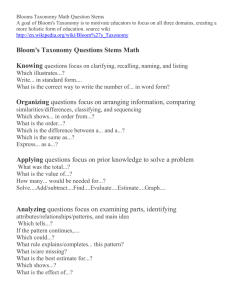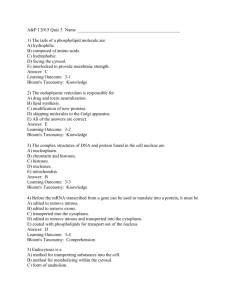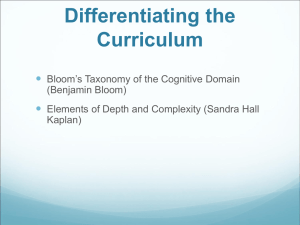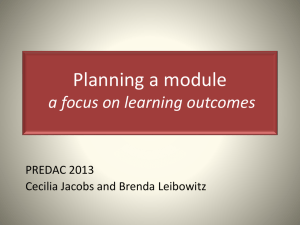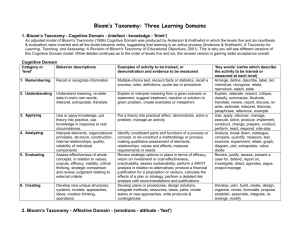Mohammad Akram Alzu`bi
advertisement
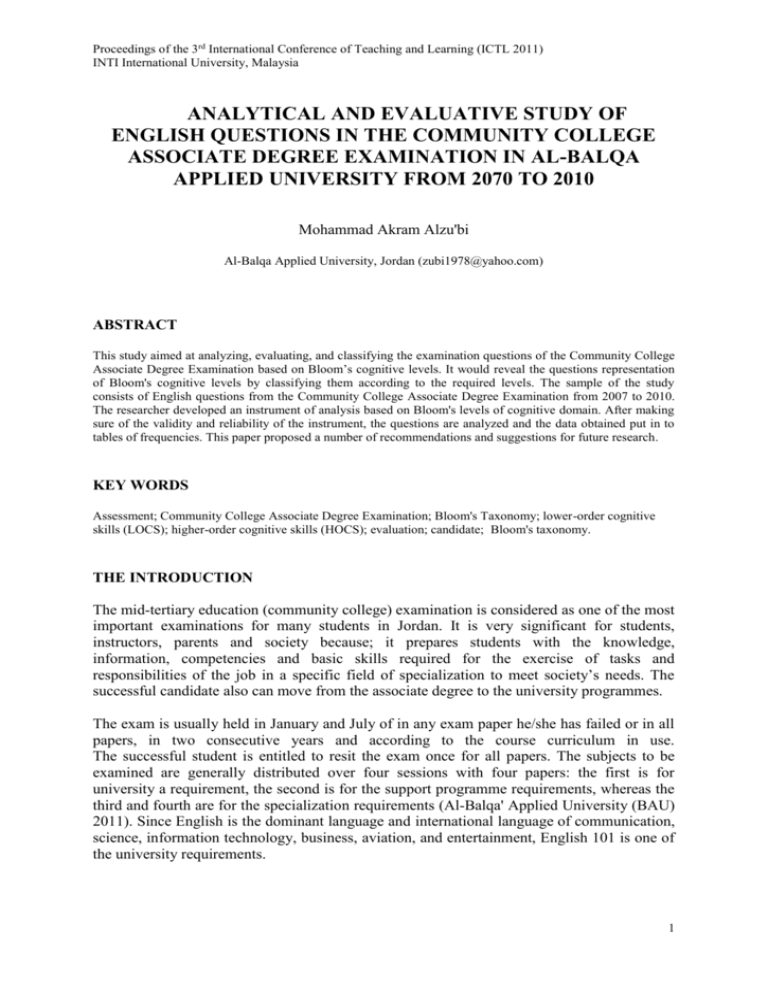
Proceedings of the 3rd International Conference of Teaching and Learning (ICTL 2011) INTI International University, Malaysia ANALYTICAL AND EVALUATIVE STUDY OF ENGLISH QUESTIONS IN THE COMMUNITY COLLEGE ASSOCIATE DEGREE EXAMINATION IN AL-BALQA APPLIED UNIVERSITY FROM 2070 TO 2010 Mohammad Akram Alzu'bi Al-Balqa Applied University, Jordan (zubi1978@yahoo.com) ABSTRACT This study aimed at analyzing, evaluating, and classifying the examination questions of the Community College Associate Degree Examination based on Bloom’s cognitive levels. It would reveal the questions representation of Bloom's cognitive levels by classifying them according to the required levels. The sample of the study consists of English questions from the Community College Associate Degree Examination from 2007 to 2010. The researcher developed an instrument of analysis based on Bloom's levels of cognitive domain. After making sure of the validity and reliability of the instrument, the questions are analyzed and the data obtained put in to tables of frequencies. This paper proposed a number of recommendations and suggestions for future research. KEY WORDS Assessment; Community College Associate Degree Examination; Bloom's Taxonomy; lower-order cognitive skills (LOCS); higher-order cognitive skills (HOCS); evaluation; candidate; Bloom's taxonomy. THE INTRODUCTION The mid-tertiary education (community college) examination is considered as one of the most important examinations for many students in Jordan. It is very significant for students, instructors, parents and society because; it prepares students with the knowledge, information, competencies and basic skills required for the exercise of tasks and responsibilities of the job in a specific field of specialization to meet society’s needs. The successful candidate also can move from the associate degree to the university programmes. The exam is usually held in January and July of in any exam paper he/she has failed or in all papers, in two consecutive years and according to the course curriculum in use. The successful student is entitled to resit the exam once for all papers. The subjects to be examined are generally distributed over four sessions with four papers: the first is for university a requirement, the second is for the support programme requirements, whereas the third and fourth are for the specialization requirements (Al-Balqa' Applied University (BAU) 2011). Since English is the dominant language and international language of communication, science, information technology, business, aviation, and entertainment, English 101 is one of the university requirements. 1 Proceedings of the 3rd International Conference of Teaching and Learning (ICTL 2011) INTI International University, Malaysia Because the questions is considered as one of the curriculum elements and a tool for evaluation, A lot of studies urge to be aware of technical of the questions that leads to improve students' thinking skills. Sigel (1985) emphasized that the question that improve thinking required different levels of difficulty rather than cognition. Also, achievement exams linked with the goals of the course, varying, measure all cognitive levels, and suitable for all students' levels. It's important to limit the goals in order to evaluate the students' achievement. So, the instructors and teacher should recognize the goals to achieve them through recognizing the characteristics of the learners, their needs, and attitudes. However, there are several methods to evaluate and analyze exam questions. For example Bloom's classification of Cognitive skills (Bloom's taxonomy) which is the most common one. It includes six levels of cognition that ordered namely knowledge, comprehension, application, analysis, synthesis, and evaluation. Bloom's taxonomy was created by Benjamin Bloom during the 1950s and is a way to categorize the levels of reasoning skills required in classroom situations. There are six levels in the taxonomy, each requiring a higher level of abstraction from the students. As a teacher, you should attempt to move students up the taxonomy as they progress in their knowledge. Tests that are written solely to assess knowledge are unfortunately very common. However, to create thinkers as opposed to students who simply recall information, we must incorporate the higher levels into lesson plans and tests. The reason that some teachers fail to move students up the levels of Bloom's taxonomy are many. For example, a teacher might have low expectations concerning the students' abilities. This is unfortunate and becomes a self fulfilling prophecy. Another reason might be that it is difficult and time consuming for the teacher. It is much easier to grade assignments based on the lower levels than on the higher levels. In fact, as you move up Bloom's taxonomy, you will find that rubrics become more important to ensure fair, accurate, and quick grading. In his experience as a language instructor, the researcher has noticed that there are few experts and researchers who study, analyze and evaluate the Community College Associate Degree Examination and the English paper in particularly. There are no studies that investigate the degree of suitability of Bloom's levels distribution on English paper questions according to accurate and controlled standards. He noticed a complain on the difficulty of examination, not verified, and it maybe focus on lower levels. As a result, the present study attempts to analyze and evaluate The Community College Associate Degree Examination of English Paper in Al-Balqa Applied University using Bloom's classification of cognitive skills. Operational Definitions The researcher adopted the following terms: The mid-tertiary education (community college) examination is considered a nationwide achievement-measuring tool applied to all students in all community colleges specializations and aims at Controlling the inputs and outputs of the teaching learning and training processes, and guaranteeing mastery of the required competencies, information and skills needed for job practice. The exam results are used as the only reliable accreditation standard for the bridging process with university programmes. Finally, it provides credibility to the associate degree 2 Proceedings of the 3rd International Conference of Teaching and Learning (ICTL 2011) INTI International University, Malaysia and professional support to its holders. It is supervised by Al-Balqa Applied University represented by the Department of Evaluation and General Examinations annually, supervised by the university’s examinations higher committee(Al-Balqa Applied University, 2011). Candidates for the exam are students enrolled in the two or three-year community colleges programmes approved by the board of higher education. Their colleges nominate them for the exam after completing their college graduation requirements.Bloom's taxonomy: is a classification system of educational objectives based on the level of student understanding necessary for achievement or mastery. It contains six levels, with the principle that competence at a higher level implies a reasonable degree of competence at the lower levels. The purposes of this study are to: 1) To recognize and analyze the cognitive levels of English questions asked in the Community College Associate Degree Examination based on Bloom’s Taxonomy. 2) To recognize the percentage of the questions included in every level of cognitive levels. Questions I. What are the cognitive levels that Community College Associate Degree Examination has measured in English course? 2. What are the percentages of the English questions included in Community College Associate Degree Examination according to Bloom's taxonomy? METHOD AND PROCEDURES The sample of the study consists of English questions used in the Community College Associate Degree Examination in Al-Balqa Applied University from 2007 to 2010 that were prepared by Al-Balqa’ Applied University, represented by the Department of Evaluation and General Examinations, undertakes the execution process of the examination annually, supervised by the University’s Examinations Higher Committee. Instruments of the study For the purpose of the study, one instrument has been used which was analytical card includes Bloom's levels in cognitive domain for English questions. The researcher used analytical descriptive approach because it’s suitable for the study, so it is based on quantitative scales to judge on what needed to be analysed. Expected results This study discover an increase in knowledge-based (lower order cognitive) questions and no substantial rise in higher order cognitive questions. Nearly 90% of the questions in all phases fell into Bloom’s two lowest categories, knowledge and comprehension. 3 Proceedings of the 3rd International Conference of Teaching and Learning (ICTL 2011) INTI International University, Malaysia The researcher used the following procedures: 1. Designing a card to analyze the English questions. 2. Making content validity of the instrument by giving it to a group of experts. 3. Analyzing the questions according to its levels by using the designed card. 4. Asking a group of analyzers to make sure of the reliability of analysis that specialized in English and education. 5. Making statistical treatment to the result of analysis to answer the questions of the study. 6. Showing the results and proposing suggestions. REFERENCES Al-Balqa' Applied University, (2011). Unit of Evaluation and Examination: The mid-tertiary education (community college) examination, Al-salt, Jordan. Azari, A.( 2005). Analysis of Turkish High-School Physics-Examination Questions and University Entrance Exams Questions According to Blooms’ Taxonomy. Turkish Science Education, Volume 2, Issue 2, November 2005 Mohnot, A. (2006). ‘Seeing the Bigger Picture’: Higher Order Cognition in the Indian Certificate of Secondary Education (ICSE) English Literature Examination. Stanford University (Master Degree). Nguyen, C. (2008). Using Bloom’s revised taxonomy to design in-class reading questions for intermediate students in the context of Vietnam. VNU Journal of Science, Foreign Languages 24 (2008) 175-183 Quthah, A.; Al-Masha'leh, M.; Alkhawaldeh, N.(2007). An Analytical and Evaluative Study of the Islamic Sciences Questions Used in the Jordanian General Secondary Certificate Examinations for Years (1997-2005) in Light of Cognitive Levels. Alnajah University Journal for Research, (2) Sevilay, K., Serkan, S., Orhan. K., and Salih Ç.(2003). Analysis of Turkish High-school Chemistry-examination questions according to Bloom's Taxonomy. Chemistry Education: Research And Practice, Vol. 4, No. 1, pp. 25-30 Sigel, Etrving: A Cognitive Developmental Approach to Question Asking, Service Princeton, New Jersey, 1983. Swedan, K. (2009). An Analytical and Evaluative Study of the Natural Geography Used in the First Secondary Grade in Syria in Light of Blooms’ Taxonomy. Journal of Damascus University, 25, (1+2). 4
